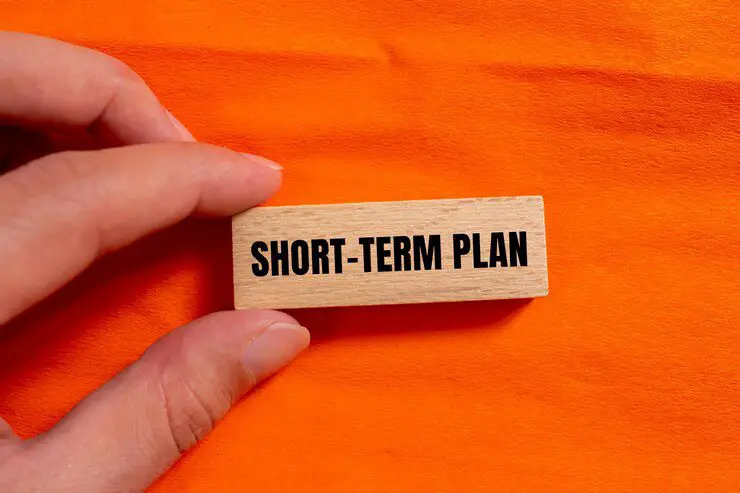Hey there, goal-getters! Did you know that setting goals for your business is like having a superpower that helps you achieve your dreams? It’s like having a magic compass that always points you in the right direction, even when you’re lost in the jungle of business.
But setting the right goals can be a bit tricky, like trying to build a tower of blocks that reaches the sky! You need a strong foundation and a steady hand to make sure it doesn’t fall over.


That’s where we come in! Here at InsiderBlog.co.uk, we’re like your friendly coaches, ready to help you set goals that will make your business a success. Think of us as your cheerleaders, always there to support you and celebrate your wins!
In this guide on how to set business goals, we’ll share six easy steps that anyone can follow, even if you’re just starting out. It’s like learning a secret code that unlocks the treasure chest of business success!
So, Startup Ninjas, grab your pom-poms and let’s cheer your business on to victory!
Winning with Your Goals
- Goals are like a map! They show you where you want to go and how to get there. It’s like having a treasure map that leads you to the gold!
- Know the difference between goals and objectives! Goals are big dreams, like wanting to be an astronaut. Objectives are smaller steps that help you reach your dream, like learning about space and building a rocket ship.
- Set SMART goals! SMART goals are Specific, Measurable, Achievable, Relevant, and Time-Bound. It’s like wanting to build a LEGO castle that’s 10 blocks tall by the end of the week!
- Believe in your goals! Don’t give up on your dreams, even when things get tough. It’s like climbing a mountain – it might be hard, but the view from the top is amazing!
- Adjust your goals if you need to! Sometimes, things don’t go as planned. It’s okay to change your goals or your plan if you need to. It’s like changing your mind about which game to play if your friends want to play something else.
- Celebrate your successes! When you reach a goal, take time to celebrate! It’s like getting a gold star for doing a good job!
- Don’t be afraid to dream big! Set long-term goals that will make your business a success. It’s like imagining your business growing up to be big and strong!
- Break down your goals into smaller steps! This makes them easier to achieve. It’s like eating a whole pizza one slice at a time!
- Track your progress! Keep an eye on how you’re doing and make changes if you need to. It’s like checking the map to make sure you’re still on the right track!
- Celebrate milestones! When you reach a small goal on the way to your big goal, take time to celebrate! It’s like finding a treasure chest on your way to the big treasure!
Understanding the Importance of Business Goals


Setting clear business goals is key for any company’s success. Goals give direction and clarity. They help you and your team stay focused on what’s important.
Without goals, it’s hard to know if you’re going the right way. Or if you’re getting closer to your goals.
Goals Provide Direction and Clarity
Good business goals mean everyone knows what to aim for. This makes everyone work together better. It keeps everyone motivated and focused on the big picture.
Goals act like a map. They guide your choices and keep you on the right path.
Goals Enable Progress Measurement
Measuring progress is vital to see if your plans work. With measurable goals, you can see how well you’re doing. This helps you know what to change to get better results.
In short, business goals are crucial. They guide, clarify, and help measure progress. By setting clear goals and tracking them, you can achieve your vision and grow your business.
Differentiating Between Goals and Objectives
It’s important to know the difference between goals and objectives in planning. Goals are big, long-term targets, like making more sales or entering new markets. Objectives are shorter and more specific, helping you reach your goals.
For instance, if you want to make 50% more money, a short-term goal might be to get a social media manager by the quarter’s end. Breaking down big goals into smaller steps makes them easier to handle. It also lets you see how you’re doing.
Goals are about what you want and why. Objectives are about how you’ll get there and when. Good planning mixes big goals with clear, achievable objectives. This keeps your team on track and motivated towards your goals.
The Significance of Long-Term Goals
Setting long-term business goals is key to success. Without a clear plan, making good decisions is hard. Companies with long-term goals do better over time.
Long-Term Goals Define Success
Long-term goals are broad but guide your business. They help you grow and stay focused. These goals show what success means for your company.
Written Goals Increase Achievement Likelihood
Writing down your goals makes you 43% more likely to reach them. It boosts your commitment and makes you more accountable. This helps you achieve your dreams.
How to Set SMART Business Goals
Setting effective business goals is key. The SMART framework helps a lot. SMART means Specific, Measurable, Achievable, Relevant, and Time-Bound. This method makes sure your goals are clear and can be done.
- Specific: Your goals should be clear and well-defined, answering the who, what, where, when, and why.
- Measurable: Include quantifiable metrics that allow you to track progress and determine whether you’ve achieved your goals.
- Achievable: Set goals that stretch your capabilities but remain realistic and attainable.
- Relevant: Ensure your goals align with your overall business strategy and priorities.
- Time-Bound: Establish specific deadlines to create a sense of urgency and keep you on track.
SMART goals give you clarity and focus. They help you succeed. This way, you make goals that are clear and can be done, helping your company grow.
Making Goals Achievable
Setting goals for your business is important. You want to aim high but not too high. Goals that are too hard can make you feel stuck.
Try to set goals that are a bit scary but you can do. These goals should make you stretch but still feel possible.
Avoiding Unrealistic Expectations
It’s key to not set goals that are too high. A study shows people with goals do better. But, your goals should be clear and doable.
Make your goals specific and easy to picture. The more detailed your goal, the better you’ll do.
Setting Incremental Goals
Big goals can feel overwhelming. Break them down into smaller steps. This makes them easier to reach.
For example, aim to get 20 new customers from nearby offices by Q2 2024. This is clearer than saying “grow more customers.”
Check your progress often. Use key performance indicators (KPIs) to guide you. This helps you stay on track and make changes when needed.
Believing in Your Goals
Starting to achieve your business goals means believing in them. It’s hard to keep going when things get tough. But, thinking about your past wins can boost your confidence.
Having reminders of your goals around you can also keep you motivated. This helps you stay on track.
Surrounding Yourself with Reminders
Creating a supportive space is key to staying motivated. Here are some ways to keep reminders of your goals close:
- Put your goals where you can see them, like on a vision board or sticky notes.
- Set reminders on your phone or calendar to check your progress.
- Tell your friends, family, or colleagues about your goals. They can cheer you on.
- Celebrate every small win to feel more accomplished.
When you’re feeling down, these reminders and supportive people can help. They keep you believing in your goals and motivated to reach them.
Celebrating your successes, big or small, is also important. It helps you feel confident and believe in your goals. Take time to see how far you’ve come.
Adjusting When Goals Aren’t Met
Changing your business plan is normal when goals don’t work out. It’s okay if not every goal is met. The important thing is to learn from these times and change your plan.
Think of missed goals as chances to learn and get better. Changing your goals and plan is part of the journey. By learning from mistakes, you can do better next time.
- Look at why you didn’t reach your goal.
- Find ways to do better next time.
- Change your plan to make goals easier to reach.
- Try the new plan and watch how it works.
- Keep trying until you get it right.
Changing your plan, learning from mistakes, and updating goals is how you grow. Stay open to new ideas and remember success is not always easy. With the right attitude and flexibility, you’ll reach your goals.
Examples of Effective Long-Term Business Goals


Setting long-term business goals is key for planning and motivating your team. These goals can help your company grow, become more profitable, or leave a lasting mark. Here are some effective long-term business goals to think about:
- Grow total sales by 40% within the next 3 years.
- Become the market leader in your niche within the next 4 years.
- Expand your company from one to four locations in the next 4 years.
- Establish a successful non-profit entity focused on environmental conservation in the next 5 years.
Remember, long-term goals should be big but doable. Break them into smaller, easy-to-measure steps. This helps you stay on track. Also, check and change your goals often to keep your team inspired and moving forward.
By setting clear, strategic long-term business goals, you inspire your team. This drives your company’s planning and helps you make a big impact. Don’t be shy to dream big with your long-term business goals.
How to Set Business Goals
Setting good business goals is key for growth and success. It means getting everyone’s input, doing a SWOT analysis, and finding important growth metrics. These steps help your business move forward.
The SMART method makes sure your goals are clear and achievable. It helps your team stay on track and focused.
- Gather input from your team to understand their perspectives and needs.
- Conduct a SWOT analysis to assess your internal and external business landscape.
- Identify the key growth metrics that will drive your business forward.
- Establish SMART goals that are clear, measurable, and time-bound.
- Communicate your goals effectively and ensure your team is aligned.
- Regularly review and adjust your goals as needed to adapt to changing circumstances.
By following these steps, you can set goals that guide your business. They help measure progress and lead to success. Remember, setting goals is an ongoing task. Be ready to change and improve as your business grows.
Examples of Short-Term Business Goals


Setting short-term business goals is key to moving forward. These goals last from 1 to 3 months. They help you see how well your company is doing quickly. Here are some short-term goals to think about:
- Increase customer happiness by 15% by answering faster and filling orders quicker.
- Make employees more engaged by 20% with a new recognition program every quarter.
- Introduce a new product or service in 2 months to offer more.
- Make 10% more money in the next quarter with better marketing and sales.
- Have a big industry event that brings in 50+ people and gets 5+ new leads.
- Lower employee leaving by 8% by offering more training.
- Save 5% on monthly costs with new cost-saving plans.
- Start tracking your monthly budget better to see your finances clearly.
For short-term goals to work, they must be clear, have a deadline, and match your long-term plans. By setting these goals and checking on them often, you can reach your goals.
Tracking and Measuring Progress


It’s important to track and measure your progress to reach your business goals. Watch your short-term results to see what works and what doesn’t. Be ready to change your plan if needed. Being flexible and open to change is key.
Monitoring Short-Term Results
Use Key Performance Indicators (KPIs) to check your progress often. These can be about sales, revenue, or customer happiness. Use software and dashboards to see your progress and get updates.
Adjusting Approach as Needed
Check your goals and steps often. If you find something that’s not working, change your plan. This might mean trying new things or getting help from your team.
Tracking your progress is a never-ending job. Keep checking your performance and making changes. This will help you reach your goals in the long run.
Celebrating Milestones and Achievements
Celebrating your business goals is key to staying motivated. It’s important to recognize your team’s progress. Whether it’s a big revenue goal or a new product launch, celebrate your wins.
Small celebrations like a team lunch or gifts can boost morale. They show the value of working together.
Milestones mark important moments in your company’s journey. Celebrating them lifts team spirits and builds unity. It also sets goals for future success.
Recognizing individual and team achievements boosts morale. It makes your company more appealing to new employees. It also improves your brand’s image.
Adding milestone celebrations to your incentive programs motivates your team. It drives good behavior. Setting specific goals for these celebrations gives direction to your organization.
Creating a routine for celebrating milestones builds a culture of appreciation. It sets the stage for growth and success in your business.
Ready, Set, Goal!
Wow, Startup Ninjas, we’ve learned so much about setting awesome goals for our businesses! It’s like we’ve climbed a mountain together, step by step, and now we’re standing at the top, looking at all the amazing things we can achieve!
Remember, goals are like our guiding stars, showing us the way to success. They help us stay focused and motivated, even when things get tough. So, make sure you set SMART goals, believe in yourself, and never give up on your dreams!
Here at InsiderBlog.co.uk, we’re always here to cheer you on as you reach for the stars! We want to see your business shine bright and achieve all its goals!
So, go out there and use your new goal-setting skills to make your business a success! And don’t forget to share this guide with your friends who might be looking for their own guiding stars. Together, we can create a whole sky full of shining businesses!
Frequently Asked Questions (FAQ)
1. What if I don’t know what my business goals should be?
It’s like not knowing what to ask for your birthday! You can start by thinking about what you want to achieve with your business. Do you want to sell a lot of toys? Do you want to make people happy?
2. What if my goals are too big?
It’s like trying to eat a whole cake in one bite! You might have to cut your goals into smaller pieces so they’re easier to achieve.
3. What if I don’t know how to make my goals measurable?
It’s like trying to measure how much you love your favorite toy! You can try using numbers or specific actions to track your progress.
4. What if I don’t believe in my goals?
It’s like not believing in magic! You might have to remind yourself of all the amazing things you’ve already achieved and how much you want to reach your goals.
5. What if I don’t know how to adjust my goals?
It’s like changing your mind about what you want for your birthday! It’s okay to change your goals if you need to, as long as you’re still moving towards your dreams.
6. What if I don’t have time to track my progress?
It’s like not having time to check the map when you’re on a treasure hunt! You might get lost if you don’t keep track of where you’re going.
7. What if I don’t know how to celebrate milestones?
It’s like not celebrating your birthday! You can do something fun, like having a party or getting a special treat.
8. What if I don’t know how to set long-term goals?
It’s like not knowing what you want to be when you grow up! You can start by thinking about what you want your business to look like in the future.
Hey Startup Ninjas, now that you’ve learned all about how to set business goals, it’s time to put on your goal-setting hats and start dreaming big! Don’t forget to share this guide with your friends on social media so they can learn the secrets too! Let’s make InsiderBlog.co.uk the coolest place for small businesses to learn about setting goals!
Source
- Copper CRM. (n.d.). How to set business goals in 6 steps. Copper CRM. https://www.copper.com/resources/bring-your-business-goals-to-life-in-6-steps
- TechTarget. (n.d.). How to set business goals, step by step. TechTarget. https://www.techtarget.com/searchcio/tip/How-to-set-business-goals-step-by-step
- BetterWorks. (n.d.). Why is corporate goal setting so important? BetterWorks. https://www.betterworks.com/magazine/corporate-goal-setting-activities/
- Harvard Business School. (n.d.). Setting business goals & objectives: 4 considerations. Harvard Business School Online. https://online.hbs.edu/blog/post/business-goals-and-objectives
- business.gov.au. (n.d.). Set goals for your business. business.gov.au. https://business.gov.au/planning/business-plans/set-goals-for-your-business
- HubSpot. (n.d.). Goals vs objectives: The simple breakdown. HubSpot. https://blog.hubspot.com/marketing/goals-vs-objectives
- Forbes. (2023, June 15). Goals vs. objectives: Why it matters, and how to set them. Forbes. https://www.forbes.com/councils/forbesbusinesscouncil/2023/06/15/goals-vs-objectives-why-it-matters-and-how-to-set-them/
- Asana. (2024). Goals vs. objectives: A project manager’s breakdown. Asana. https://asana.com/resources/goal-vs-objective
- Cascade. (n.d.). How to set up and achieve long term goals for a business. Cascade. https://www.cascade.app/blog/setup-track-long-term-goals
- Asana. (2024). How to accomplish big things with long-term goals. Asana. https://asana.com/resources/long-term-goals
- Forbes Advisor. (n.d.). The ultimate guide to S.M.A.R.T. goals. Forbes Advisor. https://www.forbes.com/advisor/business/smart-goals/
- Mailchimp. (n.d.). How to write SMART goals for your small business. Mailchimp. https://mailchimp.com/resources/smart-goals/
- Kappel, M. (2020, December 10). Become a pro at setting business goals in the new year with these 6 tips. Forbes. https://www.forbes.com/sites/mikekappel/2020/12/10/become-a-pro-at-setting-business-goals-in-the-new-year-with-these-6-tips/
- Bplans. (n.d.). Setting business goals: 5 step guide + examples. Bplans. https://www.bplans.com/business-management/set-business-goals/
- Business News Daily. (n.d.). How to set goals you can achieve. Business News Daily. https://www.businessnewsdaily.com/11225-set-achievable-business-goals.html
- Leslie, M. (n.d.). Believing in YOUR goals. LinkedIn. https://www.linkedin.com/pulse/believing-your-goals-mikkel-leslie
- Kornick, A. D. (n.d.). Believing in yourself: You are good enough to achieve your goals. Anna Kornick. https://annadkornick.com/why-you-are-good-enough-to-achieve-your-goals/
- ARootah. (n.d.). Achieve your goals by changing your beliefs. ARootah. https://arootah.com/blog/professional-development/achieve-your-goals-by-changing-your-beliefs/
- Clear, J. (n.d.). Forget about setting goals. Focus on this instead. James Clear. https://jamesclear.com/goals-systems
- Workleap. (n.d.). Set team goals right: Step-by-step guide with examples. Workleap. https://workleap.com/blog/setting-inspiring-team-goals/
- Asana. (2024). Setting business goals: The first step to business success. Asana. https://asana.com/resources/business-goals-examples
- LocaliQ. (n.d.). 8 best long-term business goals for guaranteed success. LocaliQ. https://localiq.com/blog/long-term-business-goals-with-examples/
- Smartsheet. (n.d.). Examples of effective short- to long-term business goals. Smartsheet. https://www.smartsheet.com/content/business-goal-examples
- Lonely Entrepreneur. (n.d.). 4 strong & unique examples of long-term business goals. Lonely Entrepreneur. https://lonelyentrepreneur.com/long-term-business-goals/
- HubSpot. (n.d.). How to set business goals (+ examples for inspiration). HubSpot. https://blog.hubspot.com/sales/business-goals
- Hive. (n.d.). How to set realistic business goals: Examples & tips. Hive. https://hive.com/blog/business-goals/
- Motion. (n.d.). How to set and achieve short-term goals in your business (+30 examples). Motion. https://www.usemotion.com/blog/short-term-goals
- Weekdone. (2023). 40 short-term business goals examples to set in 2023. Weekdone. https://blog.weekdone.com/examples-of-short-term-business-objectives/
- Floowi. (n.d.). How to set goals for your company and track their progress. Floowi. https://floowitalent.com/how-to-set-goals-for-your-company-and-track-their-progress/
- BloomGrowth. (n.d.). Track goal progress: Effective tracking tools. BloomGrowth. https://www.bloomgrowth.com/blog/track-goal-progress-effective-goal-tracking-tools/
- LinkedIn. (n.d.). What are some best practices for tracking and measuring your progress on SMART goals? LinkedIn. https://www.linkedin.com/advice/0/what-some-best-practices-tracking-measuring-your-1e
- M&IW. (n.d.). Seven success tips for celebrating milestones. M&IW. https://meetings-incentives.com/seven-success-tips-for-celebrating-milestones/
- Miller, L. (n.d.). Five steps: Stay focused and achieve more by celebrating milestones. LinkedIn. https://www.linkedin.com/pulse/five-steps-stay-focused-achieve-more-celebrating-miller-lnmre
- Loving Life. (n.d.). 10 unique ways to celebrate company milestones. Loving Life. https://lovinglifeco.com/hr/10-unique-ways-to-celebrate-company-milestones/
Was this helpful?
Yay! 🎉 You made it to the end of the article!



















